Alumni Notes
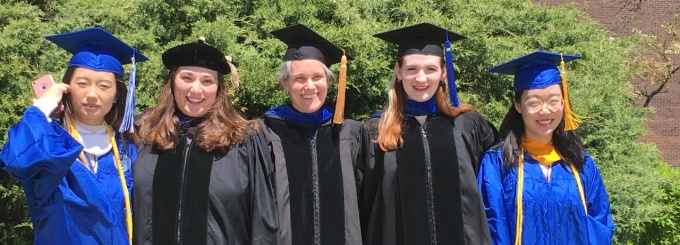
Stay connected to the Department of Biological Sciences and see what UB biology graduates are doing next. From awards to research breakthroughs to career milestones, these updates highlight the many ways our alumni make an impact.
Long Shen
Robert J. Full
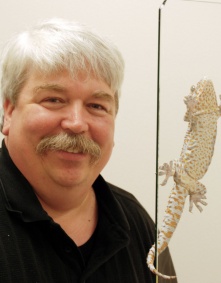
Robert J. Full
Current Position: Professor, Integrative Biology, UC Berkeley
Dissertation: Energetics of invertebrate terrestrial locomotion : a comparison of metabolic responses in exercising decapod crustaceans
Dissertation Advisor: Clyde Herreid
Graduating Year: 1979, 1984
Biographical Statement: Robert J. Full is a Chancellor’s and Goldman Professor in the Department of Integrative Biology at the University of California at Berkeley. He received his PhD from SUNY Buffalo and was a postdoctoral researcher and lecturer at The University of Chicago. In his thirty years at Berkeley, Professor Full has led an international effort to demonstrate the value of integrative biology and biological inspiration by the formation of interdisciplinary collaborations among biologists, engineers, and mathematicians from academia and industry. Professor Full is founder and director of CiBER, the Center for interdisciplinary Bio-inspiration in Education and Research, the Editor-in-Chief of the journal Bioinspiration and Biomimetics, a science advisory board member of the new journal, Science Robotics, was the Principal Investigator on an NSF Integrative Graduate Education and Research Traineeship on Bio- and Bio-inspired Motion Systems Operating in Complex Environments, and serves or has served on the advisory boards of Switzerland’s National Competency Center for Robots, Harvard’s Wyss Institute for Biologically Inspired Engineering, Research Corporation for Science Advancement, and the Annual Biomedical Research Conference for Minority Students (ABRCMS).
Professor Full’s programmatic theme is Diversity Enables Discovery where teaching and research are inseparable. He directs the Poly-PEDAL Laboratory, which studies the Performance, Energetics and Dynamics of Animal Locomotion (PEDAL) in many-footed creatures (Poly). His discoveries of fundamental principles in motion science led to the design of animal inspired neural control circuits, artificial muscles, search-and-rescue robots, and gecko inspired self-cleaning, dry adhesives. Professor Full has authored over one hundred and fifty contributions and has delivered over three hundred national and international presentations. His efforts in education has led to discovery-based courses, undergraduate research programs, service toward equity and inclusion, and outreach through web presentations, museum exhibits, radio, and TV. Professor Full received an NSF Presidential Young Investigator Award, Berkeley’s Distinguished Teaching Award, was named a Mentor in the Life Sciences, and was elected to the American Association for the Advancement of Science, and the American Academy of Arts and Sciences under the new category, Emerging Fields.
How did your academic experience as a UB Biological Sciences student prepare you for your career?
My mentor Prof. Herried is responsible for all aspects of my success!
What advice do you have for current UB Biological Sciences students?
UB prepares you to compete on a world stage. For undergraduates, get involved in research!
Carol Gregorio
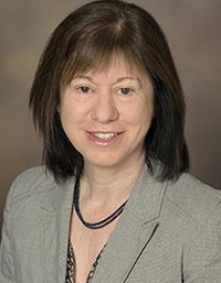
Carol Gregorio
Current Position: Vice Dean of the College of Medine; Professor and Head of the Department of Cellular and Molecular Medicine; Co-Director of the Sarver Heart Center; Director of the Molecular Cardiovascular Research Program; and Luxford/Schoolcraft Endowed Chair.
Dissertation: Determining the Function of Spectrin in Striated Muscle
Dissertation Advisor: Michael Hudecki
Graduating Year: 1986
What have you been up to since graduating?
I received a PhD in Molecular Immunology at Roswell Park Cancer Institute (in the laboratory of Dr. Betsy Repasky) and did a postdoctoral fellowship at the Scripps Research Institute in La Jolla, California (in the laboratory of Dr. Velia Fowler). In 1996, I joined the faculty at the University of Arizona as an Assistant Professor and am still a faculty member there. I did two sabbaticals: one at the Weill Cornell Medical College and one at Columbia University. I have been continuously funded by the NIH since 1997 and run a large research lab with trainees with a broad range of experience and expertise.
What are your current job and responsibilities?
I run an active research laboratory that is focused on dissecting the molecular components and mechanisms responsible for the assembly of cytoskeletal proteins in normal and diseased skeletal and heart muscle, down to the level of single molecules. We are also highly focused on identifying pathophysiologies common to all cases of human dilated cardiomyopathy (irrespective of initial cause) as targets for therapeutic intervention. I have many administrative roles at the University of Arizona, serve on many national and international grant review panels, am an associate editor for 4 journals, and give many research lectures internationally per year.
How did your academic experience as a UB Biological Sciences student prepare you for your career?
It got me excited about the creativity of being a scientist. Even today, I often can't believe that I get to address biological questions that no one has solved before.
What advice do you have for current UB Biological Sciences students?
Take advantage of every opportunity that presents to you. Learning how to design experiments, perform experiments, evaluate data and form conclusions in the context of what has been learned before, and trouble-shoot issues when things go wrong - all of which are part of the "scientific process" - is an invaluable learning experience that you will be able to use the rest of your life, regardless of what career path you take.
Amanda Herberger
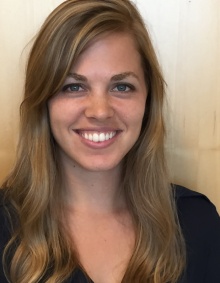
Amanda Herberger
Current Position: Postdoctoral Research Scholar, UCSF/VAMC
Dissertation: The evolutionary history of the extracellular calcium-sensing receptor and its role in skeletal development
Dissertation Advisor: Dr. Christopher Loretz
Graduating Year: 2013
What have you been up to since graduating?
I moved to San Francisco and began a postdoc position in the Endocrine Research Unit at UCSF-VAMC. Our studies focus on functional mechanisms of hormone and mineral homeostasis. I am currently supported by an F32 Training Grant, titled: The Endocrine and Skeletal Actions of the parathyroid-derived Cyp27b1.What are your current job and responsibilities?
What are your current job and responsibilities?
My focus in vertebrate endocrinology includes vitamin D metabolism, PTH secretion and actions, and bone biology. I work with transgenic animal models and regularly perform micro-dissection and culture of tissues, mineral and hormonal analyses (mouse serum procurement and ELISA analyses), immunoblotting, IHC, qPCR. I apply both lab and analytical techniques to assess the role and functions of parathyroid glands in skeletal homeostasis
How did your academic experience here, at UB Biological Sciences, prepare you for your career?
Many of the technical skills I developed at UB are directly applied in my current work, and I even reference former protocols for troubleshooting.
What advice do you have for current UB Biological Sciences students
The experience and opportunities to attend National conferences while at UB were highly valuable, and that exposure as a grad student has carried over into my postdoctoral career. Networking is the best way to pursue career development and any future position.
Steve Mauro
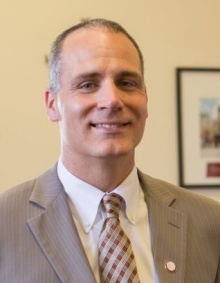
Steve Mauro
Current Position: Vice President for Academic Administration, Gannon University
Advisor: Gerald Koudelka
Graduating Year: 2003
What have you been up to since graduating?
From 2003-2005, I was a NIH sponsored postdoctoral fellow working in the lab of John Lis at Cornell University, where I studies Eukaryotic gene regulation. In 2005, I took a faculty position at Mercyhurst University in Erie, PA., a position I held for eight years. In 2013, I accepted an offer to become Dean of the Morosky College of Health Professions and Sciences at Gannon University, also located in Erie, PA. In 2015, I transitioned into senior leadership at Gannon as an academic vice president. My current position is Vice President for Academic Administration.
What are your current job and responsibilities?
As the Chief Academic analyst and strategist, my role at Gannon is to oversee entrepreneurial and innovative delivery of academic programming and support services. This includes additional campuses, distance education, and auxiliary support services. In addition, I oversee grant funding operations, institutional assessment, and student retention.
What are your current job and responsibilities?
My job involves a high degree of data analysis and interpretation.
How did your academic experience here, at UB Biological Sciences, prepare you for your career?
My time as a graduate student in the Department of Biological Sciences was critical to the development of that skill set.
What advice do you have for current UB Biological Sciences students?
It is likely that you are working on a very specific question or problem as part of your graduate training. This is great! Enjoy that time! It is very difficult to find another phase in life where you have the opportunity to focus your efforts and dedicate yourself as fully as you do as a student. My advice would be to also embrace the additional learning opportunities that come with your education. These include presentation and communication skills, thoughtful analysis, patience, and resilience to name just a few. These growth opportunities have the potential to impact your future success no matter how you apply the phenomenal education you will receive.
Jennifer (Dowhanick) Morrissette
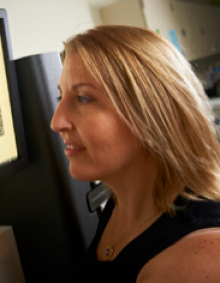
Jennifer (Dowhanick) Morrissette
Current Position: Associate Professor, University of Pennsylvania
Dissertation: Identification and Localization of enzymatic Activities Encoded by L1, on the cap-pol fusion protein of Saccharomyces cerevisiae Virus.
Dissertation Advisor: Dr. Jeremy Bruenn
Graduating Year: 1992
What have you been up to since graduating?
After graduation I did a joint postdoc at NIH and Harvard studying human papillomavirus. From there I joined a medical fellowship program and became board certified in Clinical Cytogenetics and Clinical Molecular Genetic Diagnostics
What are your current job and responsibilities?
As the Scientific Director of the Clinical Cytogenetics laboratory and the Clinical Director of the Center for Personalized Diagnostics (CPD), we try and identify somatic genetic alterations associated with cancer. These findings can be prognostic, diagnostic and/or direct therapy. I review and sign out cases and direct and attend clinical tumor boards.
How did your academic experience as a UB Biological Sciences student prepare you for your career?
In clinical medicine you have to be confident that what you are reporting is correct. During my time in Dr. Bruenn's laboratory the emphasis on controls being central to interpretation and methodically moving through experimental design was critical. We started the CPD as a new NGS laboratory, so going back to first principles learned at UB made the process more straightforward.
What advice do you have for current UB Biological Sciences students?
Figure out what you really enjoy doing in science by pursuing all the twists and curves that your interests take you. There are interesting jobs that aren't the traditional route for PhDs and they often aren't immediately apparent as a graduate student.
Chung-Mo Park
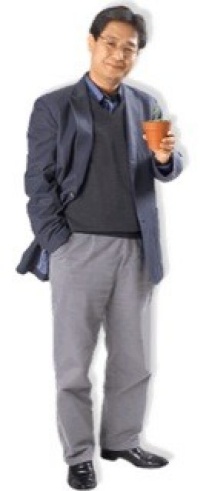
Chung-Mo Park
Current Position: Professor, Seoul National University
Dissertation: Structure and expression of the Ustilago maydis viral genomes and comparison to the Saccharomyces cerevisiae viruses
Dissertation Advisor: Dr. Jeremy A. Bruenn
Graduating Year: 1993
What have you been up to since graduating?
Following my graduate study and postdoctoral training in Buffalo, I joined the Kumho Life Science Laboratory in Korea, where I worked as PI until 2002. I then moved to Seoul National University.
What are your current job and responsibilities?
I am a professor in the department of chemistry, Seoul National University, Seoul, Korea. I am also serving as the Chair of the SNU Research Equipment Facilities.
How did your academic experience here, at UB Biological Sciences, prepare you for your career?
I would say that I did not obtain scientific knowledge but instead learned how to do science.
What advice do you have for current UB Biological Sciences students?
Your final goal of graduate study is not to obtain PhD degree but to be an expert in the field.
Curt D. Sigmund
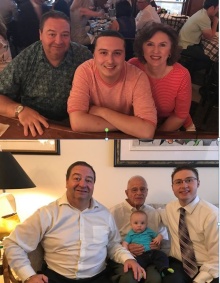
Curt D. Sigmund
Current Position: Professor and Chair, Department of Pharmacology, Roy J. & Lucille A. Carver College of Medicine, University of Iowa
Dissertation: Purified Escherichia Coli NusA Protein Has Specific and Non-specific Effects on Transcription Termination In Vitro
Dissertation Advisor: Edward E. Morgan
Graduating Year: 1987
What have you been up to since graduating?
I left UB in 1987 to move across town to take a postdoctoral position with Dr. Ken Gross at Roswell Park Cancer Institute where I made the switch from bacterial genetics to mouse models of human disease. I joined the faculty of the University of Iowa as an Assistant Professor in 1991, was promoted to Associate Professor in 1997, and to Professor in 2001. I directed the UI Transgenic and Gene Targeting Facility from 1991-2010. In 2008, I became the Roy J. Carver Endowed Chair in Hypertension Research, and in 2010 because chairperson of the Department of Pharmacology, a role I continue to this day.
What are your current job and responsibilities?
I direct a research program of about 20 researchers (students, postdocs, scientists, technician etc) on the molecular mechanisms of hypertension focusing on neural and vascular mechanisms. My research is funded by grants from the NIH (NHLBI) and the American Heart Association. As Department Chair, I am responsible for all scientific and fiscal matters related to the department. We have about 20 faculty. My most important job is recruiting new faculty and mentoring them through the difficult transition from postdoc to independence.
How did your academic experience here, at UB Biological Sciences, prepare you for your career?
My time at UB (Biological Sciences) was very rewarding, even more so in retrospect, as it was during this time both as an undergraduate and graduate student that I forged my foundations in research. Although, I no longer work in bacterial genetics, I still think like a geneticist, and many of our projects are routed in mouse or human genetics.
What advice do you have for current UB Biological Sciences students?
Take responsibility for your own education. A graduate program can only provide a foundation onto which you build. The most creative and successful people I know in this field are owns who or voracious readers. Read as much as you can in your own field, ask you advisor for the opportunity to author a review article - it is great way to push yourself intellectually. Attend seminars, even when you think they are outside of your field. I get some of my best ideas from completely unrelated seminars. Be creative and take an occasional risk. In 1999, I read a paper and because of that one paper, I started working in a new area. At the time it was a risk as I was not known in that area. But, I had an idea, and it paid off. We have now published dozens of papers in that area including several papers in Cell journals Cell Metabolism and Cell Reports. Finally, don't lose sight of what is really important- family.
Harold C. Smith
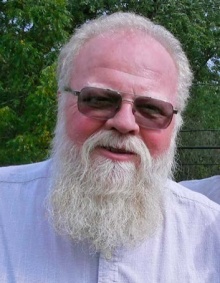
Harold C. Smith
Current Position: Full Professor at U of Rochester and CEO of OyaGen, Inc.
Dissertation Title: Induction and Localization of Alpha and Beta DNA Polymerase Activities During Regenerating Rat Liver
Dissertation Advisor: Ronald Berezney
Graduating Year: 1993
What have you been up to since graduating?
Post doc at Baylor College of Medicine, joined the faculty of the University of Rochester School of Medicine, in 1986 and rose up the ranks to full professor. Started a drug discovery drug development company in 2003. Father of three children.
What are your current job and responsibilities?
At the University of Rochester I am principally responsible for directing extramural funded basic research by postdocs, graduate students and undergraduates on RNA biology in human diseases and publication as well as teaching and directing courses. At my biotech company, I oversee research and development toward our strategic goals of developing new antiviral drugs and overseeing strategic relationships with CROs and the Federal government labs
How did your academic experience here, at UB Biological Sciences, prepare you for your career?
I learned to be unafraid of learning new technologies necessary to push my research forward and to be a critical thinker.
What advice do you have for current UB Biological Sciences students?
Identify what role you want to have in a future career and remain flexible as you work toward your goals.
Sid Sukumaran
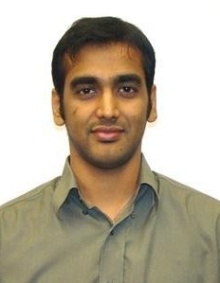
Sid Sukumaran
Current Position: Scientist, Genentech
Dissertation: Characterization of circadian rhythms in peripheral tissues using experimental and computational modeling approaches
Dissertation Advisor: Richard Almon
Graduating Year: 2011
What have you been up to since graduating?
After I graduated from the Biological Sciences program, I completed my postdoctoral training in the Department of Pharmaceutical Sciences honing my Pharmacokinetics and Pharmacodynamics (PKPD) and mathematical modeling skills. In 2012, I joined Genentech as Associate Scientist in PKPD function at Genentech. I was developing several empirical to mechanism-based mathematical models to characterize PK, PD, efficacy and toxicity of various drugs in different therapeutic areas including oncology, immunology, immune-oncology and metabolic diseases. These translational models were used to integrate different pre-clinical data to help predict clinical behaviors and were used for supporting pre-clinical and clinical studies.
What are your current job and responsibilities?
Currently, I provide expertise and guidance to support target identification/ validation, lead molecule design, selection and optimization, pre-clinical/ clinical development plan and projection of first-in-human and efficacious doses for programs in multiple therapeutic areas. I lead cross-functional teams and support regulatory filings to test new molecule entities in the clinic.
How did your academic experience here, at UB Biological Sciences, prepare you for your career?
For my thesis, I got the opportunity to work on various experimental and computational tools to characterize biological systems. I got training in doing animal experiments, molecular biology, genomics, bioinformatics and mathematical modeling of biological data. This multidisciplinary training allowed me to become a well rounded scientist and the ability to integrate scientific data from different sources to enable clear decision making.
Advice to students:
Try to incorporate a variety of experimental/computational approaches and techniques in answering your research questions. Don't get siloed into doing the same thing. Educate yourself about various career options available and the options that will be of interest for you. Grow your professional network and have constant interaction with scientists and experts in your area of interest.
David Toczyski
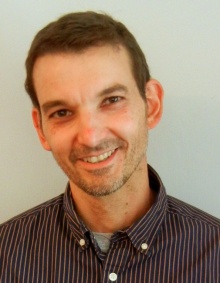
David Toczyski
Current Position: Professor, UCSF
Dissertation Advisor: Dr. Stephen Free
Graduating Year: 1986
What have you been up to since graduating?
Highlights since graduating: Ph.D. Molecular Biophysics and Biochemistry, Yale 1992; Postdoctoral fellowship, Fred Hutchinson Cancer Research Center, 1993-1998. Joined the UCSF faculty in 1998.
What are your current job and responsibilities?
UCSF is exclusively a medical/graduate school, so there is no undergraduate population. This is similar to medical schools like Rockefeller University. Therefore, my responsibilities are mostly conducting research. This is largely, meeting with Graduate students to discuss their ongoing work, some graduate teaching, reading and reviewing papers, writing and reviewing research grants, giving seminars and talks at meetings.
How did your academic experience here, at UB Biological Sciences, prepare you for your career?
I started working in a research lab in January of the sophomore year. This was the most important thing I did. It was important to have continuity, and not switch labs. The coursework was also useful, particularly the math, chemistry and molecular biology-based bio courses. Still, the most important thing was the research. I also occasionally attended the departmental seminars, using the grad students as a guide as to which would be most interesting.
What advice do you have for current UB Biological Sciences students?
1. Do as much research as possible, at least 2 years in one laboratory.
2. Take the most rigorous version of each math, physics or chemistry course available. Take the one required for students majoring in those subjects. Understanding that material will be more important than getting an 'A' in all your classes.
Hong Wanjin
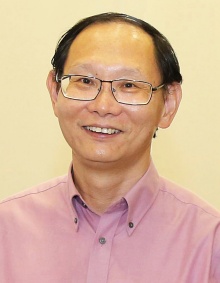
Hong Wanjin
Current Position: Professor & Executive Director, Institute of Molecular and Cell Biology (IMCB), A*STAR
Dissertation: Identification and molecular characterisation of membrane proteins enriched in the bile canaliculus domain of hepatocytes
Dissertation Advisor: Dr. Darrell Doyle
Graduating Year: 1987
What have you been up to since graduating?
I joined the Institute of Molecular and Cell Biology (IMCB) in Singapore as a Principal Investigator in 1989. Presently, I am the Professor and Executive Director of IMCB. In Singapore, my research group has published over 200 papers in international journals. I am also the recipient of National Science Award in 1999 in Singapore.
What are your current job, responsibilities, and goals?
As the Executive Director of IMCB, my job is to ensure that IMCB remains as a premier molecular biology and cell institute which seeds and fertilizes Singapore’s Pharmbio industry through focused discovery and innovative technology in human disease pathways. Our mission is to conduct cutting-edge discovery research in human disease pathways, develop innovative technologies to model human diseases and to validate disease targets for therapeutic and diagnostic purposes, and collaborate with medical & industry communities for research impact.
In so doing, I aim to increase the impact made by IMCB to promote Singapore's economic growth.
My lab specializes on Protein Trafficking and Cancer Cell Biology research. In addition, I serve as the Editor-in-Chief of Bioscience Reports and I am on the editorial board of TRAFFIC. My other affiliations include Honorary Joint Professor in Department of Biochemistry in NUS Yong Loo Lin School of Medicine and Supervisor of NUS Graduate School for Integrative Sciences and Engineering.
How did your academic experience here, at UB Biological Sciences, prepare you for your career?
The Ph.D. Training program was very supportive yet rigorous which prepared me really well to succeed in my career.
What advice do you have for current UB Biological Sciences students?
UB is certainly a great choice. Amidst the rigorous training, you can consider visiting nice places such as the Niagara Falls, sailing in the lakes, and even skiing.
Lin Wu
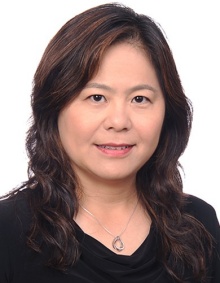
Lin Wu
Current Position: Vice President, Head of Reagent and Assay Development, Roche Sequencing Solutions
Dissertation Advisor: Gerald Koudelka
Graduating Year: 1993
What have you been up to since graduating?
1993-1998, Completed post-doctoral training on cancer cell biology at Princeton University
1998- 2013, Joined Roche Molecular Diagnostics and became a thought leader in cutting edge healthcare and diagnostics research and early development.
2013 – present, Joined Roche Sequencing Solutions and responsible for product development of next-generation sequencing assays for multiple disease areas including oncology, infectious diseases, genetics and non-invasive prenatal diagnosticsWhat are your current job and responsibilities?
What are your current job and responsibilities?
I am a Vice President of Development for Roche Sequencing Solutions. I am responsible for development programs with a staff of ~100 scientists & engineers and budget of $50M for a product portfolio of next-generation sequencing assays in multiple disease areas
How did your academic experience here, at UB Biological Sciences, prepare you for your career?
My education experience in UB was very crucial for my career. I was enrolled into the PhD program as a foreign student from China. During my first year, I almost gave it up as I could not fully understand my professors in the classes. I needed to go to their office hours very often. All the professors were very caring and supportive; always explain to me in a simple way. Because of that, I was able to quickly catch up and received my PhD in about four years.
What advice do you have for current UB Biological Sciences students?
Enjoy the journey of your PhD training and learn to define the problems, brainstorm and prioritize the solutions. Learn to excuse and troubleshoot. The basic skills can apply to many different fields.





